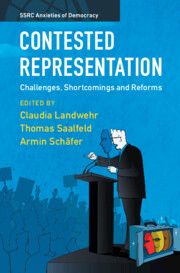48 results
Long-term Rural Settlement Continuity and Land Use during the Bronze and Iron Ages in the Northern Franconian Low Mountain Range
-
- Journal:
- European Journal of Archaeology / Volume 27 / Issue 2 / May 2024
- Published online by Cambridge University Press:
- 15 February 2024, pp. 170-191
- Print publication:
- May 2024
-
- Article
-
- You have access
- Open access
- HTML
- Export citation
Part IV - Constitutional Crisis and Institutional Reform
-
- Book:
- Contested Representation
- Published online:
- 03 November 2022
- Print publication:
- 17 November 2022, pp 257-294
-
- Chapter
- Export citation
Contributors
-
- Book:
- Contested Representation
- Published online:
- 03 November 2022
- Print publication:
- 17 November 2022, pp xv-xvi
-
- Chapter
- Export citation
Part I - The Contested Idea of Political Representation
-
- Book:
- Contested Representation
- Published online:
- 03 November 2022
- Print publication:
- 17 November 2022, pp 13-100
-
- Chapter
- Export citation
Copyright page
-
- Book:
- Contested Representation
- Published online:
- 03 November 2022
- Print publication:
- 17 November 2022, pp vi-vi
-
- Chapter
- Export citation
Sponsored by the Social Science Research Council
-
- Book:
- Contested Representation
- Published online:
- 03 November 2022
- Print publication:
- 17 November 2022, pp iii-iv
-
- Chapter
- Export citation
1 - Introduction
-
-
- Book:
- Contested Representation
- Published online:
- 03 November 2022
- Print publication:
- 17 November 2022, pp 1-12
-
- Chapter
- Export citation
Tables
-
- Book:
- Contested Representation
- Published online:
- 03 November 2022
- Print publication:
- 17 November 2022, pp xiii-xiv
-
- Chapter
- Export citation
Figures
-
- Book:
- Contested Representation
- Published online:
- 03 November 2022
- Print publication:
- 17 November 2022, pp ix-xii
-
- Chapter
- Export citation
Part III - Polarization, New Cleavages, and Shifts in Democratic Government
-
- Book:
- Contested Representation
- Published online:
- 03 November 2022
- Print publication:
- 17 November 2022, pp 185-256
-
- Chapter
- Export citation
Index
-
- Book:
- Contested Representation
- Published online:
- 03 November 2022
- Print publication:
- 17 November 2022, pp 335-348
-
- Chapter
- Export citation
Part II - Representation and Responsiveness in Unequal Societies
-
- Book:
- Contested Representation
- Published online:
- 03 November 2022
- Print publication:
- 17 November 2022, pp 101-184
-
- Chapter
- Export citation
Acknowledgments
-
- Book:
- Contested Representation
- Published online:
- 03 November 2022
- Print publication:
- 17 November 2022, pp xvii-xviii
-
- Chapter
- Export citation
Bibliography
-
- Book:
- Contested Representation
- Published online:
- 03 November 2022
- Print publication:
- 17 November 2022, pp 295-334
-
- Chapter
- Export citation
Contents
-
- Book:
- Contested Representation
- Published online:
- 03 November 2022
- Print publication:
- 17 November 2022, pp vii-viii
-
- Chapter
- Export citation

Contested Representation
- Challenges, Shortcomings and Reforms
-
- Published online:
- 03 November 2022
- Print publication:
- 17 November 2022
Long-term Outcomes of Psychological Treatment for Posttraumatic Stress Disorder: A Systematic Review and Meta-Analysis - Corrigendum
-
- Journal:
- Psychological Medicine / Volume 51 / Issue 16 / December 2021
- Published online by Cambridge University Press:
- 27 October 2021, p. 2946
-
- Article
-
- You have access
- Open access
- HTML
- Export citation
Long-term outcomes of psychological treatment for posttraumatic stress disorder: a systematic review and meta-analysis
-
- Journal:
- Psychological Medicine / Volume 51 / Issue 9 / July 2021
- Published online by Cambridge University Press:
- 28 June 2021, pp. 1420-1430
-
- Article
-
- You have access
- Open access
- HTML
- Export citation
Evidence for strong relations between the upper Tagus loess formation (central Iberia) and the marine atmosphere off the Iberian margin during the last glacial period
-
- Journal:
- Quaternary Research / Volume 101 / May 2021
- Published online by Cambridge University Press:
- 03 February 2021, pp. 84-113
-
- Article
-
- You have access
- Open access
- HTML
- Export citation
Integration of various dimensions in food-based dietary guidelines via mathematical approaches: report of a DGE/FENS Workshop in Bonn, Germany, 23–24 September 2019
-
- Journal:
- British Journal of Nutrition / Volume 126 / Issue 6 / 28 September 2021
- Published online by Cambridge University Press:
- 04 December 2020, pp. 942-949
- Print publication:
- 28 September 2021
-
- Article
-
- You have access
- Open access
- HTML
- Export citation



